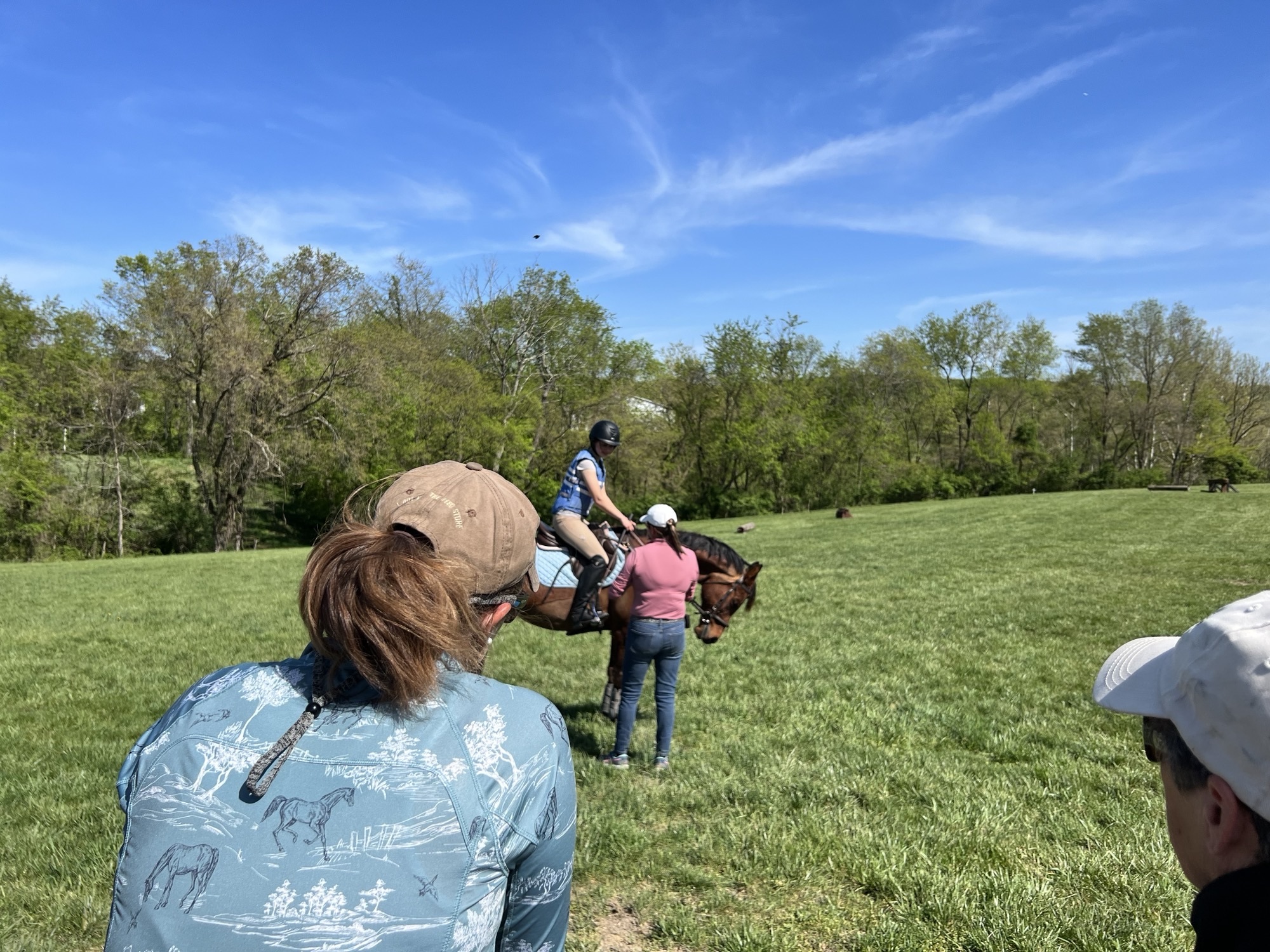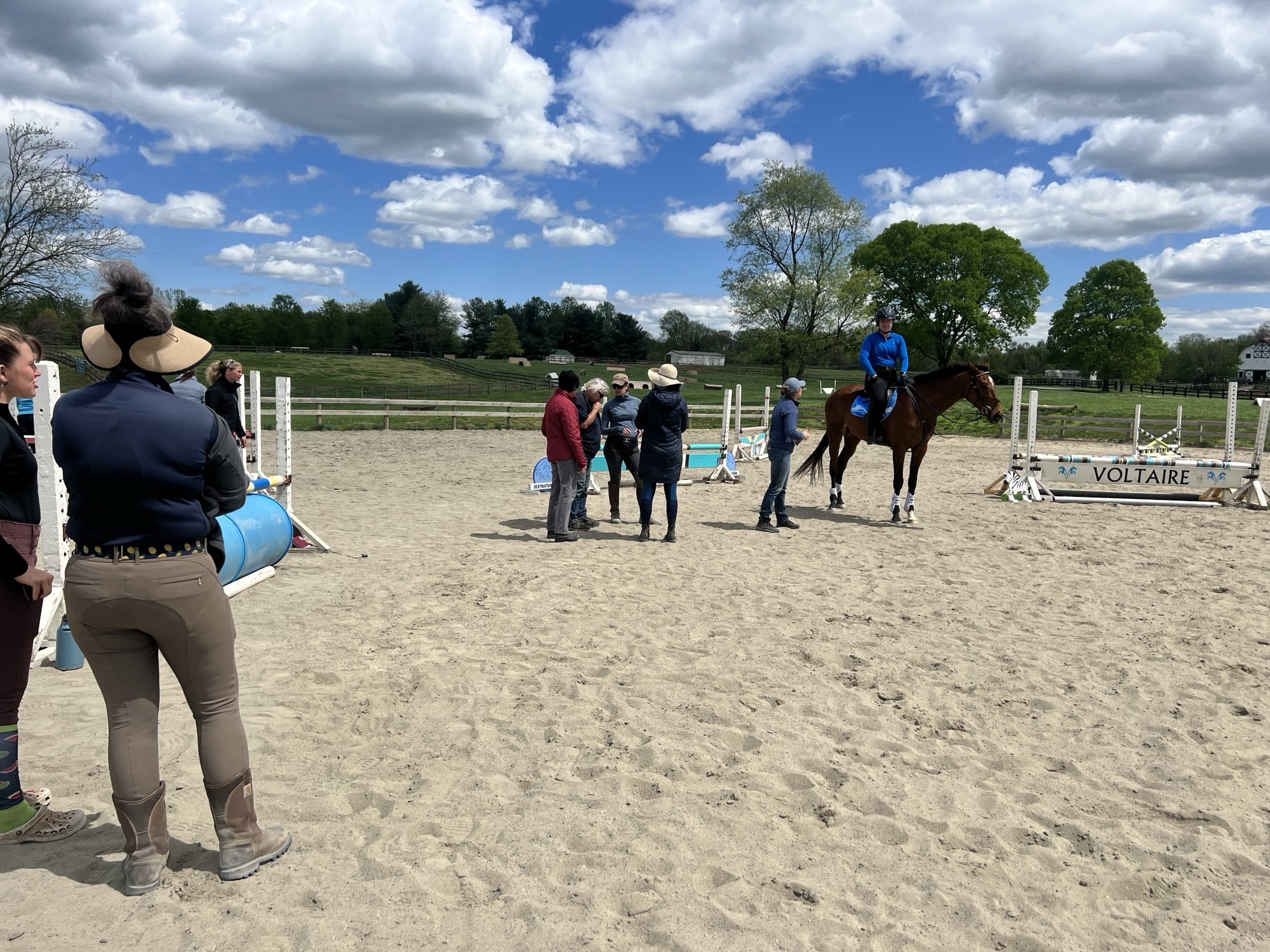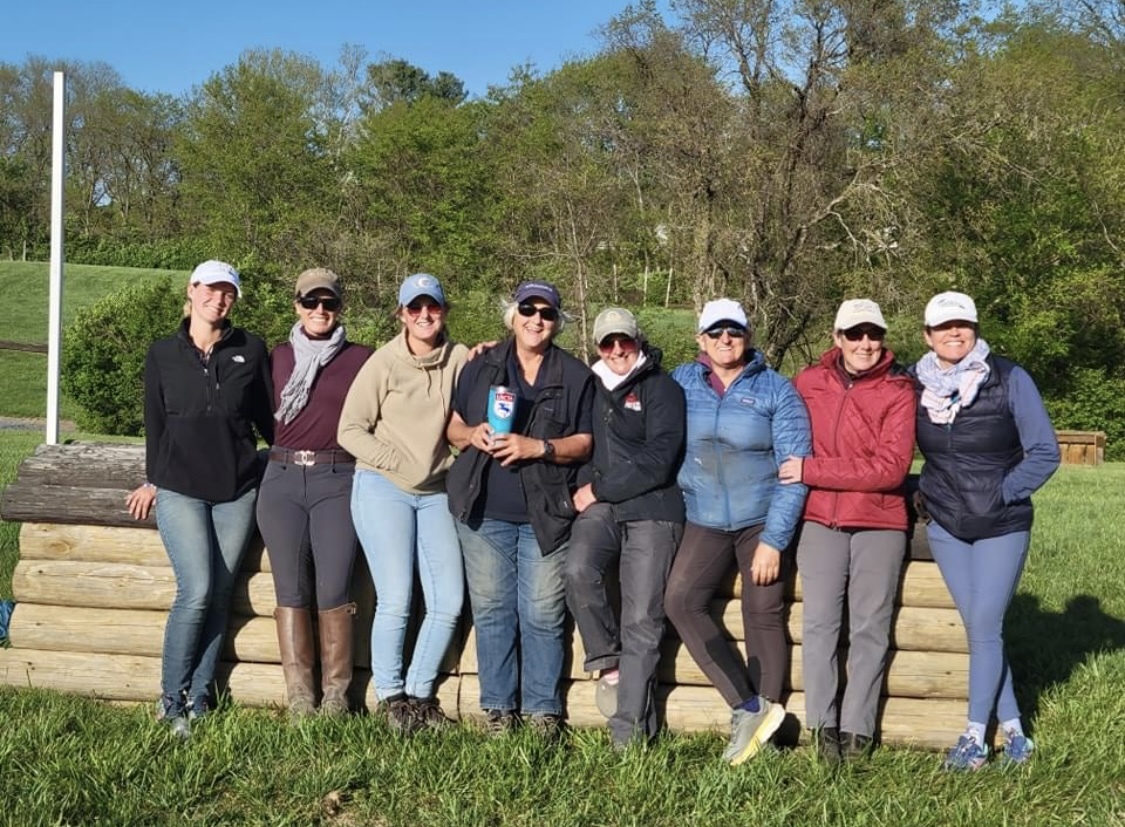ECP Workshop at Destination Farm and Loch Moy Farm - Developing a New Eye!

Angie Francart, RN, BSN, RNFA, MHA, CNOR, is the owner and founder of Sleeping Fox Farm Thoroughbred Rescue, Inc. a non-profit organization for off-the-track Thoroughbreds who can no longer have a second career. She's also a USEA member currently competing at the Modified and Preliminary level and the owner and founder of Sleeping Fox Farm Eventing.
A registered nurse/nursing administrator, Francart is a certified safety coordinator with the USEA and is pursuing her USEA Eventing Coaches Program (ECP) certification.
She recently attended two ECP workshops, one at Loch Moy Farm in Adamstown, Maryland, and one at Destination Farm in Dickerson, Maryland, and wrote about her experience.
Wow, what an amazing experience and well worth the time, pressure, and nerves! As I sit down to write this article, I have just watched Kentucky with a new lens on rider, horse, position, questions, and quality of canter. I have also since coached at several events, and as I walked the courses with my students and watched riders go, I was doing so with a new perspective. I was reminded that I am more educated and better informed thanks to the Eventing Coaches Program (ECP).
As eventers we need to make our programs better and stronger for the future of our safety and the longevity of the sport. As our coach Phyllis Dawson told us, what makes us “Us” is cross-country. This the heart of us. So how do we ensure we stay safe and strong in the Olympics, and also remain a sport that is fun for both horse and rider? Have an association that cares and a community like no other. One that will literally give you the shirt, bridle, girth, and yes, clothes off their backs or out of the trailer to ensure your success. Yes, we are eventers!
So, let’s begin with why and how it feels to be the candidate coach and why it’s important for you as an instructor, coach, or rider, to continue your education. As a lifelong learner holding a masters and four college degrees, maybe I’m just an education junkie along with my other addictions like horses and adrenaline.

I can only speak from my perspective. It was a journey 4+ years in the making. Contacting the USEA and telling them I was ready to begin the certification process, or was I? Turns out it took many years to coordinate the time, riders, money, and ability, but I did it, and I’m glad I did! I gained new knowledge, learned new techniques, shared stories, and, as we know in our community, made new friends.
USEA got it right, and divided the education into sections which made the education and time more affordable and practical. As eventers, riders, coaches, and owners we all watch every cent spent, and a day off the farm could mean money out of our pockets. But let me say this again, it’s worth every cent…wow!
So, I’m finally registered. Let me be clear, it’s not easy to get to this point if you don’t have enough students competing and/or your own coaches to support your goal. If you are like me, competing, coaching, being coached, running your own programs; it can all be a bit overwhelming. So, why? Because we need to make the sport safe and fun.
The program is divided into three different sessions. The first three days are focused on dressage. Fast forward to day one. I am finally here after four years. I enter the big dressage ring at Destination Farm shaking from head to toe; like imagine the first time you run the big Prelim cross-country course, or worse “public speaking” on steroids. Because this is like riding a dressage test with 15 judges watching you, without the horse. The day starts with introductions and lectures on expectations and the program. It is great to know we all felt the same, had very similar backgrounds, we shared the same thoughts, and we quickly learned that we all were nervous and excited.

The program is well worth it! For example, we learned: do not compromise, teach to the level, be safe, know the positions, the strides, the aids, the rules, the goals…….oh and have a plan to teach all of this after evaluation of a rider and horse you have only met five minutes ago.
But this isn’t anything we don’t know as eventers. We thrive under pressure, we love the challenge, and we can make a plan for safety as quick as we ask for a canter lead. But also, as eventers we are rather fearless and will take on a challenge. However, we need to remember that as coaches, we need to keep our sport in alignment with what is best practice.
For example, do not push riders to move up the levels or allow it until they are ready (do not accept compliancy). I see this as riders and horses or both moving up the levels too quickly without the necessary education or time to understand the most important part of our sport—cross-country. We need to ensure our riders and horses are safe and prepared for cross-country as well as all the phases. An alignment of coaching, verbiage, structure, and understanding of the dynamics and questions will help provide this framework.

Moving back to the education process of certification of becoming an eventing coach. We have now moved into the process and learned what to expect, the why, the who, the times, and watched Phyllis teach/demonstrate the process. It’s my turn.
My rider enters the ring, I have two to three minutes to introduce myself, learn about the rider/horse, do safety checks, and watch them go for another two to three minutes. Then the really, really, nerve-wracking part—teach a lesson with noticeable improvement made and give homework. Also, explain the plan and do this while 15-20 of your peers, instructor, owners, demo riders, and instructors discuss your teaching and evaluate you. TALK about INTENSE—like eventing this is not for the faint of the heart.
You gave your lesson, and you hope it went well, but somehow in the middle your forgot how to speak, teach, ride, coach, but you only have a few more minutes. Then the wrap up and homework. You thank your rider and head back to the group and candidate coaches for your feedback. The first question is, “Well—I think I remember how to speak!
Moving on to the next workshop, show jumping and cross-country at Destination Farm and Loch Moy Farm. Again, we have the same amount of time to learn and three days to gain knowledge from each other, come up with an educated plan, and demonstrate a positive safe difference in both horse and rider. The nerves from the first workshop are back, and now we are standing in the middle of a show jump ring.
We are once again all supporting each other and nervous about what demo horse and rider will we get. A rusher, stopper, one that runs out, or a fearful rider. We need not worry—we have had our morning lecture, which provided a lot of education on how to work with many of these common issues. We also discuss the fearful rider—and the all-too-brave but not yet ready rider. Yes, this was well worth the time and money.
The final two days of our jumping workshop was a focus on the heart of our sport, cross-country. The position of the rider, the schooling techniques, and how best to approach all elements on course. As a competitor myself, I often forget how often we change our position based on the question. This was stressed again in our workshop, which for me was a great reminder to add into my lesson plans since as riders we often forget what becomes natural or second nature to us needs to be taught. An excellent reminder
The wrap up after each workshop was terrifying and educational. Terrifying as an eventer, coach, and nurse I wanted to be good/better and provide education that was safe. Educational as it was informative and constructive useful information. Each candidate and this private one-on-one, with Phyllis, which also gave us opportunity for improvement, encouragement, and homework. However, for me if felt a bit scary like going into the principal’s office; did I pass? Can I get certified? What went well? What went wrong?
I started this article by saying I have Land Rover Kentucky on, and I’m more educated watching dressage, looking for a quality canter in show jump and rider position on cross-country. As I watch, I have a better, new eye on technique, horse, and rider. Would I recommend this program? Yes!!!! Just remember rhythm, direction, balance, and speed. Focus on the quality of the canter, do not accept complacency, teach to the level and be accountable for the outcomes of our riders and horses. It’s a new experience, a foundation for consistency in the assurance of our sport. A brighter, smarter, stronger, safer alignment for eventing coaches. Do it if you think about being a coach, do it for the foundation, do it for our horses and riders.
I would like to give a special thank you to Phyllis Dawson, Natalie Hollis, Suzanne Cornue, and Carolyn McIntosh, for the opportunity to experience these amazing workshops and to Nancy Knight for always encouraging me to stick with my passion and goals.
About the USEA Eventing Coaches Program (ECP)
Coaches are essential to the training of riders and horses for safe and educated participation in the sport of eventing. The USEA Eventing Coaches Program (ECP), formerly known as the Instructors’ Certification Program (ICP), was initiated in 2002 to educate all levels of eventing coaches with crucial training principles upon which they can continue to build throughout their teaching careers. ECP offers educational workshops and assessments by which both regular coaches, Level I through Level V, Young Event Horse (YEH) coaches, and Young Event Horse professional horse trainers can become ECP certified. Additional information about ECP’s goals, benefits, workshops, and assessments as well as names and contact information for current ECP certified coaches, YEH coaches, and YEH professional horse trainers are available on the USEA website. Click here to learn more about the USEA Eventing Coaches Program.















